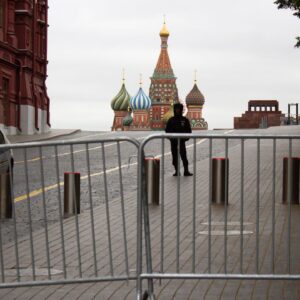Vladimir Putin’s inability to prevent it means he failed at his most important task.
In the Spring of 2022, at the moment when it became clear that Russia’s invasion had begun to falter, the generals planning Ukraine’s campaign grasped that their resistance on the battlefield could turn Russian commanders against each other. Infighting and disunity, they calculated, would be a crucial step in bringing home to Russia and its people that the war was unwinnable—and that the country was paying an intolerable price to satisfy the vanity of their president, Vladimir Putin. It was one route to victory.
Little can they have imagined that their wishes would be so spectacularly fulfilled. On the evening of June 23rd Yevgeny Prigozhin mutinied, along with his irregular troops in the Wagner mercenary group. Over the next 24 hours, they captured Rostov-on-Don, Russia’s ninth-largest city, and embarked on a lightning-fast 1,000km charge towards Moscow, before striking a deal and turning around with about 200km to go. Having criticised the botched invasion, Mr Prigozhin was calling for the defence minister and the chief of the general staff to be sacked.
In terms of tactics, the Wagner mutiny has divided and distracted the Russian army. In the trenches its men will know that, while they are being ordered to give up their lives for a war that Mr Prigozhin has branded as corrupt, their commanders are squabbling among themselves over power and influence. In the barracks officers will be splitting their attention between the war and their own futures. They know that, if there is a power struggle, they need to end up on the right side.
For Ukraine, by contrast, the mutiny is an opportunity. Its counter-offensive, now three weeks old, has fallen behind schedule. Although most Ukrainian forces still remain in reserve, progress has been hard. There could be no better moment to break through Russian lines. It is surely no accident that the Ukrainians appear to be trying to retake Bakhmut, purchased with the blood of thousands of Wagner troops and which ordinary Russians perceive as their side’s only gain over the past year. If Ukraine wins back the town, it will underline Mr Prigozhin’s message to ordinary Russians that Mr Putin and his generals are failing.
Secondly, the mutiny has undermined Russia’s strategy. Ever since his initial assault failed, Mr Putin’s theory of victory has been that the West would come to believe that backing Ukraine is a waste of money and effort. However, Mr Prigozhin has shown that time may not be on Mr Putin’s side after all.
Russia cannot just keep doing the same thing over and over again. Now that Wagner has shown how thin Russia’s defences are, Mr Putin needs to reinvigorate his command and replenish his troops. And yet, if he embarks on a fresh mobilisation, he risks stirring up popular discontent. When Mr Putin stands in front of a camera and insists that his “special military operation” is proceeding according to plan, he wants to send the message that he will never, ever back down. After Mr Prigozhin’s escapade, he risks coming across as deluded.
That leads to the third and most significant dimension of this 24-hour drama: its effect on Mr Putin’s leadership. Russia’s president has been humiliated. Wagner and Mr Prigozhin, an ex-convict who ended up as a Kremlin fixer, are his creations. In the Russian system, Mr Putin governs by managing the potentially lethal competition between rival factions. He oversees an armed truce. His inability to prevent Wagner’s mutiny means that he failed at his most important task…..
